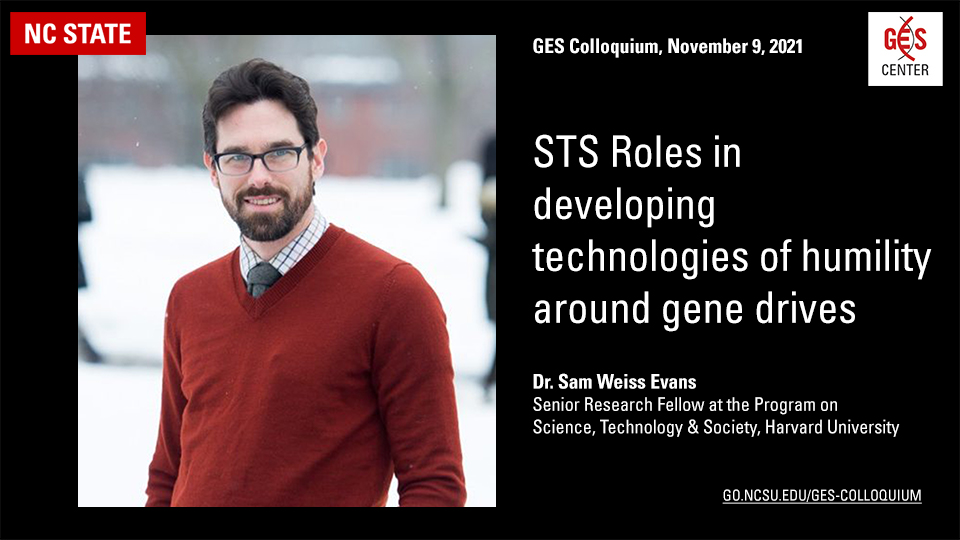
- This event has passed.
Sam Weiss Evans – STS Roles in developing technologies of humility around gene drives | GES Colloquium

Colloquium Home | Zoom Registration | GES Video Library (current) | Video Archives | Podcast | @GESCenterNCSU | Newsletter
STS Roles in developing technologies of humility around gene drives
Dr. Sam Weiss Evans, Senior Research Fellow at the Program on Science, Technology & Society, Harvard University
As different groups work out whether and how to pursue gene drive organisms, Sam Weiss Evans explores the ways STS researchers can enrich the attention to diverse perspectives, equity, vulnerability, and learning.
Abstract
In the development of gene drives, claims for ecosystem-altering capabilities are often coupled with calls for research programs to engage with diverse groups. This talk explores the ways that STS researchers have helped shape the development of gene drives, drawing out the various roles they have had and how those roles have and have not advanced a research and policy agenda that favors attention to technologies of humility: contrasting framings, the distribution of benefits and harms, the capabilities of vulnerable populations to be heard and responded to, and the potential for institutionalized learning over time.
Speaker Bio
Dr. Sam Weiss Evans is a Lecturer and Research Associate at Harvard’s John A. Paulson School of Engineering and Applied Sciences, a Research Fellow in Harvard’s Program on Science, Technology, and Society at the John F. Kennedy School of Government, a Research Affiliate in the Program on Emerging Technology at the Center for International Studies at MIT, and a Research Affiliate at the University of Cambridge’s Centre for the Study of Existential Risk. Sam is worried that security is thought about too much by people who just think about security, and not enough by people who don’t. How are decisions made about what areas of science and technology become objects of security concerns? How are decisions about whether something is a threat tied to our ways of managing, or ignoring, that [non-]threat? These are some of the questions Sam likes to ask. Other questions focus on the relationship between people like him—Science and Technology Studies researchers—and the people whom he works with and studies. What is the appropriate amount of critical distance to be able to see the context of an environment clearly while still being close enough to the action to have some influence on it? Sam loves trying out different answers to these questions and learning from them. He also loves learning from you.
GES Colloquium is jointly taught by Drs. Dawn Rodriguez-Ward and Jen Baltzegar, who you may contact with any class-specific questions. As conditions allow, colloquium will be held in-person in Poe 202, as well as live-streamed via Zoom. Please subscribe to the GES newsletter for updates (links above).
WordPress database error: [Unknown column 'wp_tec_occurrences.start_date' in 'SELECT']SELECT SQL_CALC_FOUND_ROWS wp_posts.*, CAST( wp_tec_occurrences.start_date AS DATETIME ) AS event_date
FROM wp_posts LEFT JOIN wp_term_relationships ON (wp_posts.ID = wp_term_relationships.object_id) LEFT JOIN wp_postmeta ON ( wp_posts.ID = wp_postmeta.post_id AND wp_postmeta.meta_key = '_EventHideFromUpcoming' ) LEFT JOIN wp_postmeta AS mt1 ON ( wp_posts.ID = mt1.post_id )
WHERE 1=1 AND wp_posts.ID NOT IN (16540) AND (
wp_term_relationships.term_taxonomy_id IN (149,521,802)
OR
wp_term_relationships.term_taxonomy_id IN (45,47)
) AND (
wp_postmeta.post_id IS NULL
AND
( mt1.meta_key = '_EventStartDate' AND CAST(mt1.meta_value AS DATETIME) >= '2026-01-09 21:21:54' )
) AND wp_posts.post_type IN ('post', 'page', 'attachment', 'tribe_venue', 'tribe_events', 'tribe_event_series') AND ((wp_posts.post_status = 'publish'))
GROUP BY wp_tec_occurrences.occurrence_id
ORDER BY event_date ASC, wp_posts.post_date ASC
LIMIT 0, 3